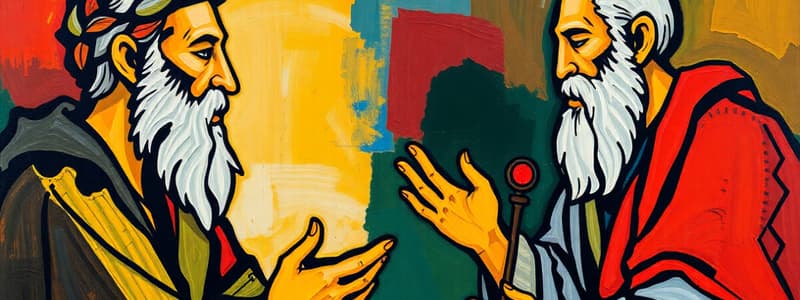Podcast
Questions and Answers
What does Socrates emphasize as essential for achieving a good life?
What does Socrates emphasize as essential for achieving a good life?
- The accumulation of power
- The development of the soul and attainment of virtue (correct)
- The practice of persuasive techniques
- The mastery of rhetoric
How does Socrates view rhetoric that is divorced from truth and justice?
How does Socrates view rhetoric that is divorced from truth and justice?
- As a valuable tool for persuasion
- As a dangerous instrument (correct)
- As an essential part of a just society
- As an effective means to achieve power
What criticism does Socrates level against Callicles's perspective?
What criticism does Socrates level against Callicles's perspective?
- It provides a proper account of justice
- It fails to acknowledge the weak have rights (correct)
- It misunderstands the nature of power (correct)
- It accurately defines the good life
What method does Socrates employ in his dialogues to pursue deeper understanding?
What method does Socrates employ in his dialogues to pursue deeper understanding?
What perspective does Polus defend in the discourse on rhetoric?
What perspective does Polus defend in the discourse on rhetoric?
What is the primary focus of Plato's Gorgias?
What is the primary focus of Plato's Gorgias?
How does Socrates differentiate true rhetoric from mere persuasion?
How does Socrates differentiate true rhetoric from mere persuasion?
According to Socrates, what is the relationship between justice and virtue?
According to Socrates, what is the relationship between justice and virtue?
What does Socrates argue about living a pleasurable life?
What does Socrates argue about living a pleasurable life?
What is a major theme in the dialogue regarding the good life?
What is a major theme in the dialogue regarding the good life?
How does Socrates view those who claim to be just without understanding virtue?
How does Socrates view those who claim to be just without understanding virtue?
What analogy does Socrates use to explain the need for justice?
What analogy does Socrates use to explain the need for justice?
What criticism does Socrates make regarding Gorgias' and Polus' view of rhetoric?
What criticism does Socrates make regarding Gorgias' and Polus' view of rhetoric?
Flashcards
Socrates on the good life
Socrates on the good life
A good life is achieved by cultivating and developing the soul to attain virtue.
Socrates's critique of rhetoric
Socrates's critique of rhetoric
Rhetoric, when not combined with truth and justice, can be harmful and manipulative.
Polus's defense of rhetoric
Polus's defense of rhetoric
Polus argues that the ability to persuade equals power, but Socrates contradicts him by highlighting the potentially negative consequences of persuasion without wisdom.
Callicles's cynical view
Callicles's cynical view
Signup and view all the flashcards
Socrates's method of inquiry
Socrates's method of inquiry
Signup and view all the flashcards
Philosophy
Philosophy
Signup and view all the flashcards
Plato's Gorgias
Plato's Gorgias
Signup and view all the flashcards
Rhetoric
Rhetoric
Signup and view all the flashcards
Mere Persuasion
Mere Persuasion
Signup and view all the flashcards
Just Life
Just Life
Signup and view all the flashcards
Virtue
Virtue
Signup and view all the flashcards
Hedonistic Life
Hedonistic Life
Signup and view all the flashcards
Philosophical Inquiry
Philosophical Inquiry
Signup and view all the flashcards
Study Notes
Overview of Plato's Gorgias
- Plato's Gorgias is a philosophical dialogue exploring the nature of rhetoric, justice, and the good life.
- The dialogue takes place in a specific time and place, set in a formal gathering of prominent figures participating in the conversation.
- It features a discussion among Socrates, Gorgias, Polus, and Callicles.
- The overall goal is to investigate the true nature of rhetoric and determine what constitutes a just life in relation to virtue and the good.
Socrates' Critique of Rhetoric
- Socrates argues that rhetoric, as practiced by Gorgias and Polus, isn't genuine expertise because it solely focuses on persuasion without regard for truth. This is a central theme.
- Socrates distinguishes between true rhetoric and mere persuasion, highlighting that rhetoric serving justice is valuable.
- He questions rhetoric's legitimacy when it seeks only personal gain or satisfies desires without considering virtue.
The Nature of Justice
- Socrates repeatedly emphasizes that justice is inextricably linked with virtue.
- He challenges those claiming to be just but lacking an understanding of their actions in relation to virtue.
- Socrates's arguments suggest justice isn't just avoiding punishment or obeying laws, but an inherent characteristic of a virtuous soul aligning with cosmic principles.
- The dialogue suggests justice is a fundamental human need, requiring care and nurturing like a plant.
- The definition and understanding of justice are central, alongside the argument for a just life compared to a pleasurable or hedonistic one.
The Argument for the Good Life
- A significant theme is exploring the nature of a good life.
- Socrates contends a good life is intimately connected with philosophical inquiry focused on understanding virtue.
- He challenges those prioritizing pleasure or personal gain as the basis for a good life, arguing that such a view has negative consequences.
- Socrates emphasizes the soul's development and attaining virtue as prerequisites for a good life, implying a close connection between a good life and cultivating the soul.
The Role of Rhetoric in a Just Society
- A central point of contention is Socrates's critique of rhetoric detached from the pursuit of justice.
- He argues that rhetoric, without truth and justice, can be a dangerous tool.
- Socrates asserts true rhetoric is a tool for achieving knowledge and justice.
- Ideally, rhetoric persuades those unknowingly lacking knowledge to pursue what is beneficial for themselves and the community.
Polus's and Callicles's Responses
- Polus, a student of Gorgias, defends rhetoric as a form of power through persuasion.
- Socrates effectively refutes Polus, highlighting the lack of wisdom in his arguments and the potential negative repercussions.
- Callicles presents a cynical, power-based view contrasting Socrates' ideals, suggesting the strong's natural right to dominate the weak.
- Socrates argues Callicles' perspective doesn't adequately address justice and the good life.
Socrates's Method of Inquiry
- The dialogue displays Socrates' method, which emphasizes careful questioning and challenging assumptions to achieve deeper understanding.
- This method involves persistently questioning proposed definitions and justifications.
- This back and forth discussion highlights the importance of seeking truth.
Studying That Suits You
Use AI to generate personalized quizzes and flashcards to suit your learning preferences.



